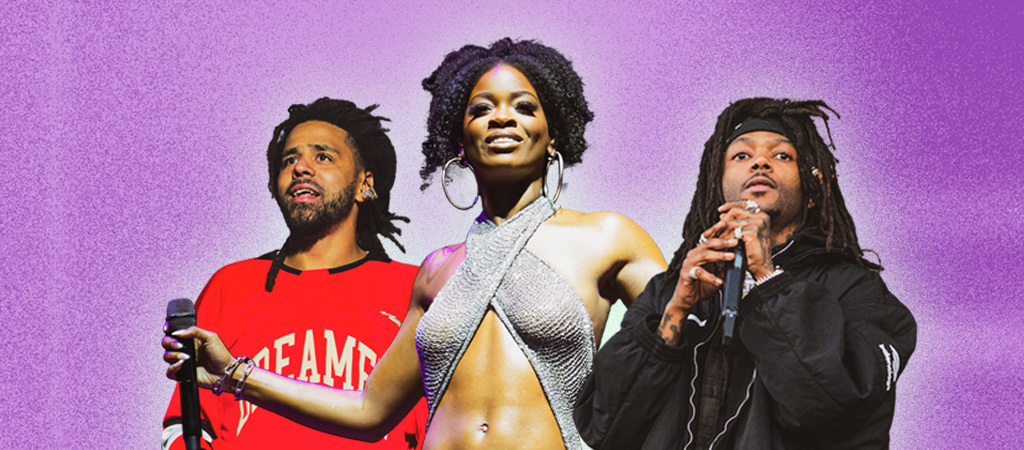
Last year, I called Tyler The Creator’s Camp Flog Gnaw the best music festival in today’s market. In two reviews running, I wrote that the Los Angeles-based fest set the standard by focusing on fan experience, highlighting local music, food, and overall vibes, and maintaining a close-knit feel among the artists on stage.
So it makes sense that one of the few other festivals hitting all those high points would be another artist-owned and curated festival, J. Cole’s Dreamville Festival. Now in its fifth and final year, Dreamville Festival has rightfully earned a reputation as one of the best-in-class festivals around, and with its end, it’s leaving behind a void that few other festivals can fill. It also leaves behind a blueprint for other mid-size festivals to follow, and perhaps its success can be duplicated in the future by other artist-fronted festivals.
The number-one tenet of Dreamville’s success over the past year is baked into the concept. Unlike other artist-owned festivals or hip-hop festivals that rely on organizing principles like a sound or an era, Dreamville is based around the stable of artists on J. Cole’s label, Dreamville Records. Since the label already includes an array of artists with different but thematically similar sounds and overlapping fanbases, Cole has already created a draw that makes the price of admission much more appealing.
Think about a wide-ranging lineup for a festival like Coachella. For a casual fan, maybe only the top line artists are interesting enough to warrant a ticket, so if the headliners don’t appeal, the surrounding experience might not feel worth it. For a hip-hop-oriented event like Lyrical Lemonade’s Summer Smash, the diversity of sounds on the lineup could draw a wider range of fans — or, a fan of, say, Saba would simply not find it worth the price since there aren’t too many other acts of his ilk on the flyer.
With Dreamville, the odds of a J. Cole fan also enjoying a frequent collaborator like Ari Lennox or Bas is higher. Likewise, the lesser-known artists like Cozz or Lute get the halo effect of sharing certain stylistic aesthetics with JID or Earthgang. The “family-first” concept ensures that there’s a solid enough foundation to build on that there’s always been a core of “day-one” fans willing to buy-in on the strength of the brand name before any glitzy stars are added to the bill. This is similar to Flog Gnaw, in that many of Tyler’s Odd Future cohorts are practically guaranteed to show up.
When those big names are booked, though, there’s a relatively easy to grasp throughline: These are Cole’s faves, his friends, and his extended family. Bold-print names like Big Sean and 21 Savage from the first year were folks Cole shares multiple or recent songs with. Likewise, Drake’s appearance in 2023 presaged the two blog-era faves’ eventual joint tour — which really was a good idea before Drake decided to take shots at you-know-who on “First Person Shooter.”
Older acts like Lil Wayne, Nelly, and Usher are clear influences on J. Cole, and were the top names in the game as he rose through the ranks. It makes sense some of his biggest fans would also look up to those artists. This is family-first, extended to include older branches and roots of the family tree that spawned Cole and his Dreamville compatriots, as well as musical “cousins” like SZA and Summer Walker, Ari Lennox’s fellow descendants of Erykah Badu — who is, fittingly, also performing at this year’s final festival.
Even the food options at the festival each year put more focus on local businesses from J. Cole’s home state, North Carolina. The upcoming final festival boasts a 30% increase in vendors, with over 76 local eateries offering everything from barbecue (the state’s signature) to Filipino finger foods. It’s clear that care and intention was put into every aspect of the festival experience, all with keeping the theme of family and community at the forefront of the festival’s strategy. With this year’s food lineup growing and the music lineup coming full circle, Dreamville Festival is going out with a bang. Hopefully, any new fests that crop up to fill the space will take its family-first outlook to heart.
source https://uproxx.com/music/j-cole-dreamville-festival-kept-it-in-the-family/
Comments
Post a Comment